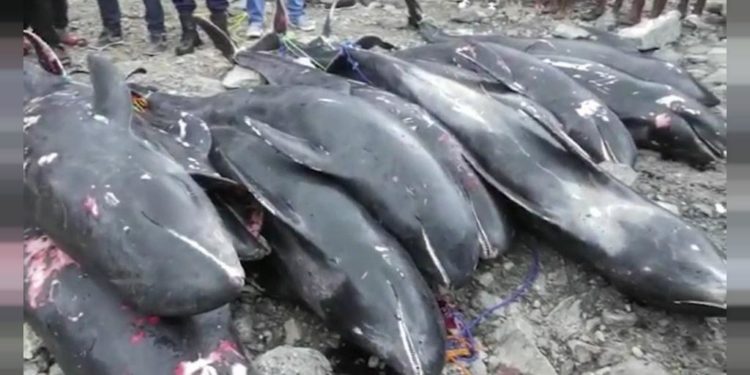The Centre for Coastal Management here at the University of Cape Coast yesterday held a day’s stakeholder workshop aimed at mobilizing a global response to unravel the cause of the mass stranding of Dolphins along the shores of Axim early this month.
The multi-stakeholder partnership brought together stakeholders from a wide range of institutions such as the Environmental Protection Agency, the International Whaling Commission (IWC), the Ghana Fisheries Commission among others.
In a presentation, the lead researcher, Dr Isaac Okyere indicated that the workshop is key in helping the Centre establish proper institutional networks and structures that can help handle strandings of marine mammals more effectively in the country.
Background to the workshop
The platform discussed the necropsy or post mortem of the specimen that were collected from Axim. The focus was on how researchers planned the necropsy to be able to inform the general public as to what caused the beaching of the mammals.The essence of the post mortem is to help narrow down the guess work and also to come up with more plausible reasons as to the cause of the beaching of the whales and the reason for the mass stranding. After presentation discussion were from quarters such as the media, academia, IWC, EPA etc. These widely expressed the need for communities on the need to protect these endangered species and education for indigenous communities to collaborate with researchers in the event of such mammals beaching. The presentation established that all the dolphins were alive when they beached and community members started butchering them. As a result, about two thirds of the dolphins escaped back into the sea and about one third were captured. Later, at the insistence of the Marine Police, the Fisheries Commission and the Axim Police Command, about 40 live dolphins that were captured were also escorted back by their captors into the sea the following morning.
The main International partner in this entire work is the International Whaling Commission, and then the Fisheries Commission and EPA, these are the critical institutions that were on board. Then stakeholders such as UCC SMS, Department of fisheries, Centre for Coastal Management, Marine Fisheries Department, the Marine Police and other sister Universities in the country such as the University of Ghana and the University of Science and Technology. The IWC has a committee on stranding of dolphins and the expert panel on the committee are drawn from different countries. So on yesterday’s platform, there were participation from the Netherlands, South Africa, Holland, Thailand etc . We had about 10 global experts. The hall mark of this whole discussion is that the Centre for Coastal Management UCC is facilitating for a cetacean expert to be flown into the country by the weekend to lead in the post mortem investigations. This is UCCs contribution to the fisheries.
Source: ATLFMNEWS

























